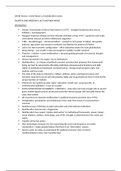Class notes
David Harvey A brief history neoliberalism chapter 1 notes
- Course
- Institution
- Book
DAVID Harvey: A brief history of neoliberalism: CHAPTER ONE: FREEDOM’S JUST ANOTHER WORD NOTES this is a summary of chapter 1 in david Harvey's book
[Show more]




